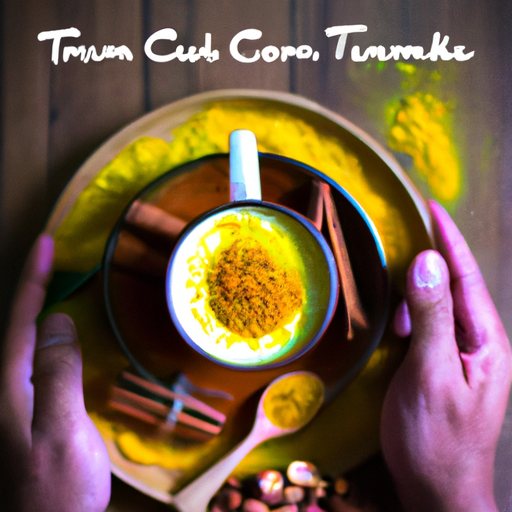As an individual who has faced challenges with thyroid problems, I have consistently searched for natural solutions to aid in supporting thyroid health. One particular remedy that has become increasingly popular is turmeric. However, is turmeric truly beneficial for the thyroid?
In this article, we will explore the scientific evidence behind turmeric’s potential benefits for thyroid health, as well as its traditional uses and precautions.
First, let’s take a closer look at the thyroid gland and its functions. The thyroid gland is a small butterfly-shaped gland located in the neck, responsible for producing hormones that regulate metabolism and other bodily functions. When the thyroid gland is not functioning properly, it can lead to a number of health issues, such as weight gain, fatigue, and mood changes.
While traditional treatment options such as medication and surgery are available, some individuals are turning to natural remedies like turmeric to support thyroid health.
Key Takeaways
- Turmeric contains curcumin, which has anti-inflammatory properties that can reduce inflammation and oxidative stress in the thyroid gland.
- Consuming turmeric with black pepper or a fat source can increase curcumin absorption.
- Turmeric supplements may interact with some thyroid medications, and excessive consumption can have negative side effects.
- Alternative and complementary therapies, such as lifestyle changes, natural supplements, and acupuncture, can also support thyroid health, but should be used with caution and only after consulting with a healthcare professional.
Understanding the Thyroid Gland and its Functions
Did you know that the thyroid gland plays a crucial role in regulating your metabolism? This butterfly-shaped gland located in your neck produces thyroid hormones that control the speed at which your body’s cells work. These hormones are essential for maintaining normal body functions, including heart rate, body temperature, and weight.
Without adequate thyroid hormones, your body’s metabolic processes may slow down, leading to a condition known as hypothyroidism. One of the most common causes of hypothyroidism is iodine deficiency. Iodine is an essential nutrient required for the production of thyroid hormones. The thyroid gland uses iodine from the foods we eat to make the hormones thyroxine (T4) and triiodothyronine (T3).
If your diet lacks iodine, your thyroid gland cannot produce enough hormones, resulting in hypothyroidism. In addition to iodine deficiency, other factors that can affect thyroid function include autoimmune disorders and certain medications.
Now that we understand the basics of thyroid function, let’s explore some common thyroid disorders.
Common Thyroid Disorders
One of the most prevalent endocrine disorders is the malfunctioning of the thyroid gland, which can lead to a range of health issues.
Hyperthyroidism, a condition where the thyroid gland produces an excessive amount of hormones, can cause symptoms such as weight loss, rapid heartbeat, and anxiety.
On the other hand, hypothyroidism, where the thyroid gland produces insufficient hormones, can result in fatigue, weight gain, and depression.
There are various causes of hypothyroidism, including autoimmune diseases such as Hashimoto’s thyroiditis, iodine deficiency, and certain medications.
Hyperthyroidism, on the other hand, can be caused by Graves’ disease, overconsumption of iodine, or tumors in the thyroid gland.
It’s important to recognize the symptoms of these common thyroid disorders and seek medical attention if necessary.
In the next section, I’ll discuss traditional treatment options for thyroid disorders.
Traditional Treatment Options
If you’re experiencing symptoms of a thyroid disorder, your doctor may suggest traditional treatment options such as medication or surgery, which can be likened to a crutch that supports your body while it heals. Just as a crutch helps you walk with ease, these treatments can help regulate your hormone levels and alleviate symptoms. However, some people may prefer to explore herbal remedies and natural supplements as an alternative or complementary treatment option.
One popular herb that has gained attention for its potential health benefits is turmeric. Turmeric contains a powerful antioxidant called curcumin, which has been studied for its anti-inflammatory properties and potential role in improving thyroid function. While more research is needed to fully understand the effects of turmeric on thyroid health, incorporating it into your diet as a spice or taking supplements may offer some benefits. In the next section, we will explore turmeric and its medicinal properties in more detail.
Turmeric and its Medicinal Properties
Get ready to discover the amazing benefits of incorporating turmeric into your daily routine. This powerful herb has been used for centuries in traditional medicine to treat a variety of ailments, including inflammation, digestive issues, and skin problems. Turmeric is known for its anti-inflammatory and antioxidant properties, which make it an excellent addition to any diet.
There are many ways to incorporate turmeric into your daily routine, including using it in cooking and taking turmeric supplements. Turmeric recipes can include adding the spice to soups, stews, and curries, or even making a turmeric tea. Turmeric supplements are also available in various forms, such as capsules, powders, and liquid extracts.
By incorporating turmeric into your daily routine, you can potentially improve your overall health and well-being. As we explore the benefits of turmeric, it’s important to note that the active ingredient responsible for many of its health benefits is curcumin.
In the next section, we’ll delve into the effects of curcumin on thyroid health.
Curcumin and its Effects on Thyroid Health
Let’s dive into how curcumin can positively impact the health of your thyroid gland, giving it a boost of energy like a jolt of caffeine in the morning. Curcumin, the active compound in turmeric, has been shown to have anti-inflammatory and antioxidant properties, which can benefit the thyroid gland.
Here are some ways in which curcumin can support thyroid health:
-
Curcumin absorption, dosage, and bioavailability: Curcumin is poorly absorbed by the body, but taking it with black pepper or a fat source can increase its bioavailability. The recommended dosage of curcumin varies depending on the source, but it’s generally safe to take up to 8 grams per day.
-
Potential interactions with thyroid medication: Curcumin may interact with some thyroid medications, so it’s important to talk to your doctor before taking it if you’re on medication.
-
Turmeric’s impact on other body systems, such as the immune system and inflammation: Turmeric has been shown to have positive effects on the immune system and reduce inflammation, which can benefit overall health.
It’s important to note that while curcumin may have potential benefits for thyroid health, more research is needed to fully understand its effects. In the next section, we’ll take a closer look at studies on turmeric and thyroid health.
Studies on Turmeric and Thyroid Health
As we learned in the previous subtopic, curcumin, the main active compound in turmeric, has been studied for its potential effects on thyroid health. However, it’s important to note that turmeric supplements may also have an impact on thyroid hormone levels.
Several studies have been conducted on the effects of turmeric supplements on thyroid health. One study found that turmeric supplementation in rats with hypothyroidism resulted in improved thyroid function and reduced oxidative stress. Another study in humans with subclinical hypothyroidism found that turmeric supplementation for 8 weeks resulted in improved thyroid hormone levels.
While these studies are promising, more research is needed to fully understand the effects of turmeric supplements on thyroid health.
Moving on to the next section, there are various ways to incorporate turmeric into your diet to potentially benefit your thyroid health.
Ways to Incorporate Turmeric into Your Diet
There are numerous tasty and creative ways to add turmeric to your meals and snacks, potentially boosting your overall health and wellness. One easy way is to sprinkle it on roasted vegetables or add it to scrambled eggs. Another option is to make a turmeric latte by blending turmeric, coconut oil, almond milk, and honey.
You can also incorporate turmeric into your salad dressing or use it to season meat dishes. If you’re looking for a quick and convenient option, turmeric supplements are also available in capsule form.
Turmeric recipes and supplements offer a simple and delicious way to incorporate this powerful spice into your diet. However, it’s important to note that excessive consumption of turmeric may have negative side effects.
In the next section, we’ll explore precautions and potential side effects of using turmeric for thyroid health.
Precautions and Side Effects
Before you start using turmeric supplements for your thyroid health, it’s important to be aware that just like any other supplement, they come with potential side effects that can be compared to a double-edged sword: they can provide benefits, but they can also harm you if not used properly. One of the most important factors to consider is the dosage. While turmeric is generally considered safe, taking large amounts can cause gastrointestinal issues such as bloating, nausea, and diarrhea. It’s recommended to start with a small dose and gradually increase to avoid adverse reactions.
Additionally, it’s important to know the contraindications of turmeric. People with gallbladder issues, bleeding disorders, or those taking blood-thinning medication should avoid using turmeric. It’s also important to be aware of any medication interactions. Turmeric can interact with certain medications, such as blood thinners and diabetes medication, which can cause adverse effects. Therefore, it’s important to consult with a healthcare professional before starting to take turmeric supplements for thyroid health. With proper care and attention, turmeric can provide benefits for thyroid health, but it’s important to use it cautiously to avoid any potential harm.
As we’ve discussed the precautions and side effects of turmeric, it’s important to note that there are alternative and complementary therapies to consider for thyroid health. These include lifestyle changes such as diet and exercise, as well as other natural supplements like ashwagandha and selenium. It’s always important to consult with a healthcare professional before starting any new supplement or therapy, and to consider all options before making a decision.
Alternative and Complementary Therapies
If you’re looking for ways to support your thyroid health, exploring alternative and complementary therapies can be valuable. For example, acupuncture has been shown to offer benefits for those with thyroid disorders. This traditional Chinese medicine practice involves the insertion of thin needles into specific points on the body, which can stimulate the body’s natural healing processes and improve thyroid function.
Herbal remedies can also be used as alternative and complementary therapies for thyroid health. Some herbs that have been shown to support thyroid function include ashwagandha, guggul, and bladderwrack. However, it’s important to note that herbal remedies should be used with caution and under the guidance of a qualified healthcare professional, as they can interact with medications and have side effects.
As with any alternative or complementary therapy, it’s crucial to do your research and consult with a healthcare professional before incorporating them into your treatment plan.
Frequently Asked Questions
Can turmeric completely cure thyroid disorders?
I’ve found that while turmeric benefits thyroid health, it cannot completely cure thyroid disorders. However, alternative therapies such as acupuncture and meditation have shown promising results in improving thyroid function.
Is there a recommended dosage for turmeric intake for thyroid health?
I recommend consulting a healthcare professional for the appropriate dosage of turmeric for thyroid health. While turmeric has anti-inflammatory properties, it can interact with certain medications and may cause potential side effects.
Can turmeric be used as a replacement for traditional thyroid medication?
While turmeric has shown potential in supporting thyroid health, it cannot replace traditional medication. It may be used as a natural remedy in conjunction with medication. Always consult with a healthcare professional before making any changes to your treatment plan.
Are there any contraindications for using turmeric for thyroid health?
I have researched potential contraindications for using turmeric for thyroid health. Some discussion points could include potential side effects and interactions with other supplements. It is important to consult with a healthcare professional before using turmeric as a supplement.
Can turmeric interact with other medications used for thyroid disorders?
As someone taking medication for thyroid disorders, it’s important to be aware of potential drug interactions and side effects. Turmeric may interact with some medications and cause side effects such as nausea and diarrhea. Consult with a healthcare provider before taking turmeric supplements.
Conclusion
Overall, I’ve found that turmeric may have some potential benefits for thyroid health. Studies suggest that curcumin, the active compound in turmeric, may help regulate thyroid function, reduce inflammation, and protect against oxidative stress. One interesting statistic that stood out to me is that a 2015 study found that curcumin supplementation significantly improved thyroid function in patients with autoimmune thyroiditis, a common thyroid disorder.
This suggests that turmeric may be a promising complementary therapy for those with thyroid conditions, but it’s important to consult with a healthcare provider before incorporating it into your treatment plan.
In conclusion, while there’s no one-size-fits-all approach to thyroid health, incorporating turmeric into your diet may be a simple and natural way to support thyroid function and overall well-being. As always, it’s important to discuss any changes to your treatment plan with a healthcare provider.










